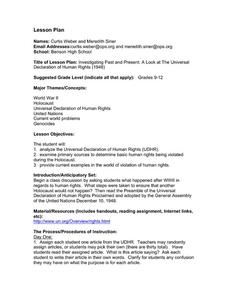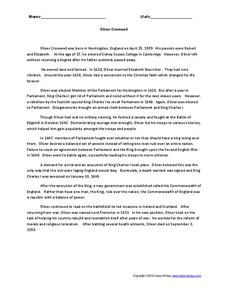Curated OER
Brooks-Baxter War
Sixth graders discuss and research the Brooks-Baxter War and the election of governor for Arkansas in 1872. In this election lesson plan, 6th graders read about the candidates for governor and why the election was disputed.
Curated OER
Investigating Past and Present: A Look at The Universal Declaration of Human Rights
Students compare the Universal Declaration of Human Rights to the war crimes of WWII. In this lesson on Human Rights, students evaluate the causes of WWII, war crimes, and determine whether the outcome might have been different otherwise.
Curated OER
The Westward Movement
Learners study the westward movement through examining stamps. In this westward movement lesson plan, students draw conclusions, determine cause and effect relationships and examine the westward movement of the United States by...
Curated OER
Inventors & Trailblazers
Students are introduced to a groups of African American inventors. In groups, they research the role of each person in improving different industries. They also examine the barriers African Americans faced from the Civil War to the...
Curated OER
Oliver Cromwell
In this Oliver Cromwell worksheet, students read about the life, career and death of Oliver Cromwell. They learn about the Second English War and how the Commonwealth of England was established. They then answer 14 questions pertaining...
Curated OER
Abraham Lincoln, the 1860 Election, and the Future of the American Union and Slavery
Students examine Abraham Lincoln's political views about slavery. In this American Civil War lesson, students determine how Lincoln's beliefs led to the restriction of slavery in American territories. Student also analyze the party...
American Battlefield Trust
Southern Secession and Abraham Lincoln’s Presidential Election
President Abraham Lincoln: a true humanitarian or a savvy politician? The lesson focuses on Abraham Lincoln's presidency and the secession of the southern states. Academics interpret how Lincoln's presidential platform promoting African...
Curated OER
The Kansas-Nebraska Act of 1854: Popular Sovereignty and the Political Polarization over Slavery
Why did Stephen Douglas support the Kansas-Nebraska Act of 1854? Why did Abraham Lincoln oppose it? Young historians examine how the Kansas-Nebraska Act of 1854 affected the political balance between free and slave states and explore how...
Facing History and Ourselves
Defining Freedom
The Emancipation Proclamation freed slaves in the Confederate states. The Thirteenth Amendment banned slavery in the United States. However, neither document defined freedom. The second lesson in the Reconstruction Era series examines...
Facing History and Ourselves
Violence and Backlash
Revolution and counterrevolution. Protest and counter-protest. Collaborators and bystanders. The focus of the fifth resource in the Reconstruction Era and Fragility of Democracy series is on the political violence that followed Radical...
Curated OER
Major Events Leading to the American Revolution
Students explore the causes of the American Revolution. In this taxation without representation lesson plan, students analyze political cartoons in order to gain an understanding of the efforts of the colonists to resolve conflict with...
Curated OER
North V. South And The Bank Creation
Eighth graders investigate the economic status of America during the 1800's and the role of the bank in the early times of our country. They concentrate on the different jobs that people had in the North and South while classifying them...
Curated OER
The Civil War
Eleventh graders study selected prints and/or photos and consider how Americans of the 19th century chose to present themselves to other Americans and the world by means of visual images. They share their observations and opinions.
Curated OER
Sojourner Truth
Students research Sojourner Truth. In this African-American history lesson, students read the speech "Ain't I A Woman?" and brainstorm descriptive words that describe Sojourner Truth. Students discuss why her acts were considered...
West Virginia Department of Education
The Debate - John Brown: Martyr or Madman?
Did he die for a cause, or was he crazy? Although the resource discusses John Brown and West Virginia history, many historical figures have the same reputation. Teach learners about different perspectives and highlight the importance of...
National Endowment for the Humanities
A Journalist’s Report: The Better Vision for Black Americans
After reading a series of primary source documents detailing the teachings of Martin Luther King, Jr. and Malcolm X, class members craft newspaper columns assessing the strengths and weaknesses of each man's vision, and present their...
iCivics
Conflict & Cooperation
Considering such conflicts as the Vietnam War and the war in Afghanistan, what motivates nations to cooperate? Your class members will analyze past and current international events in order to understand the types of conditions and...
Curated OER
MANY REASONS TO LEAVE
Students research different economic, cultural, and social characteristics of slavery after 1800, how slavery hindered the emergence of capitalist institutions and values, and slavery both prior to and after the Civil War.
Curated OER
The Solid South Switcharoo
Learners examine primary sources. In this lesson on political parties, students view historic documents, speeches, and photos to trace the rise and fall of particular political parties. Learners will be looking at the success of each...
Curated OER
The Crusades
Students investigate the series of religious wars known as the Crusades. In this Crusades lesson, students research Christian and Muslim beliefs and create posters that compare the two. Students discuss the causes of the wars as well as...
Curated OER
Prevent Child Abuse
Learners research documents and photographs by Lewis Hine on child labor. They examine documents and summarize them. Students complete several photograph analysis worksheets. Their research and documents begin after the Civil War.
Curated OER
Looking for Lincoln's Views on Slavery
Students reflect on Abraham Lincoln's views of slavery. In this United States History lesson, students analyze how things have changed in the United States over the course of their lifetime, then use this information as a comparison to...
Center for History Education
Daily Lives of Slaves - What Really Happened?
The stories of enslaved people are preserved forever thanks to the Great Depression. Budding historians explore slave narratives gathered by a federal government initiative to discover what life was actually like for enslaved people....
Curated OER
Samuel's Choice - Social Studies Using Children's Literature
Fifth graders read a book about independence, freedom, and slavery. Students create a story map of the book. They research the causes of the Civil War. Students write a newspaper article from the point of view of an American colonist.
Other popular searches
- American Civil War Causes
- Civil War Causes
- Us Civil War Causes
- U.s. Civil War Causes
- The Causes of the Civil War
- History Causes of Civil War

























